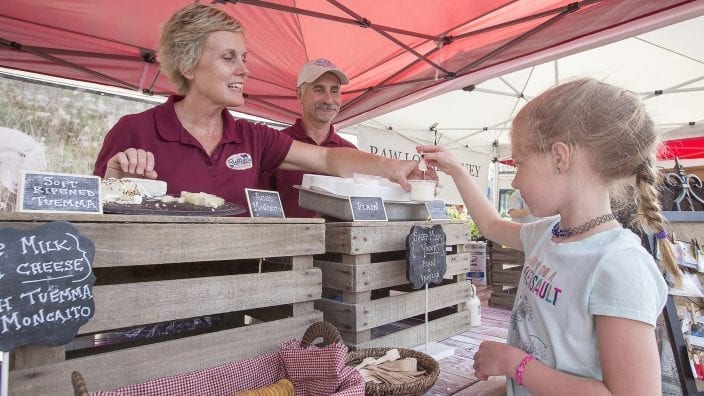Farmer’s Guide to Trucking Regulations available to Ohio Farm Bureau members
The guide includes a farm driver checklist, overview of state and federal regulations and exemptions, CDL qualifications and more.
Read More
During the COVID-19 crisis, more and more people are turning to local farmers and smaller “mom and pop” producers for their basic needs. Trying to take care of the new influx of customers can be daunting, especially with limited staff trying to abide by all the parameters set forth by the need to social distance and still operate an essential business.
Ohio Farm Bureau’s Mandy Orahood, organization director for Ashtabula, Geauga, Lake and Trumbull counties, recently spoke of one member who was ready to close the storefront of their small meat processing facility because of the increase in foot traffic into their facility.
“They have been incredibly busy and can’t even get most of the orders fulfilled,” she said, noting that they are in a unique situation. Their store is located in a tourist area in the state and people are coming to “quarantine” away from people they are close to who might have been exposed to the novel coronavirus. The member is concerned about the health and well being of themselves, their employees and other customers entering the store.
Knowing the unique needs of their small business, Orahood gave them some tips to proceed during this trying time.
“The tips I gave them aren’t anything new and creative,” she said. “They are just so overwhelmed that I think having ideas come from an outside source is helpful. It is critical to our food supply that those essential employees producing, processing, shipping and stocking shelves remain healthy. Don’t ever feel bad about implementing practices to keep you, your staff, customers and families safe and healthy.”
Increase awareness/Get your point across
Other ideas
Use curbside only – Lock the doors; no customers can enter
Connect with customers


The guide includes a farm driver checklist, overview of state and federal regulations and exemptions, CDL qualifications and more.
Read More


The emergency fuel waiver to allow the sale of summer gasoline blends containing 15% ethanol will lengthen the period during which Americans can continue buying E15 from June 1 to Sept. 15.
Read More

The Small-Scale Food Business Guide covers federal and state regulations for selling food products such as raw meat, dairy, eggs, baked goods, cottage foods, fruits and vegetables, honey and more.
Read More

New resources and technology are broadening the different types of sales tools and strategies available to farmers.
Read More

ODA will enroll 500,000 acres into the program for a two-week sign-up period, beginning April 22, 2024, through May 6, 2024. Contact local SWCD offices to apply.
Read More

Katie Share of Columbus has been named ExploreAg and Youth Development Specialist for Ohio Farm Bureau.
Read More

Mary Klopfenstein of Delphos has been named Young Ag Professional and Ag Literacy Program Specialist for Ohio Farm Bureau.
Read More

The plan has been updated to give sole proprietors access to more rate stability and a smart solution that offers potential savings on health care.
Read More

The American Farm Bureau Federation, in partnership with Farm Credit, is seeking entrepreneurs to apply online by June 15 for the 2025 Farm Bureau Ag Innovation Challenge.
Read More

Adele Flynn of Wellington has been elected treasurer of the Ohio Farm Bureau Federation and now holds the third highest elected office in Ohio’s largest and most influential farm organization.
Read More